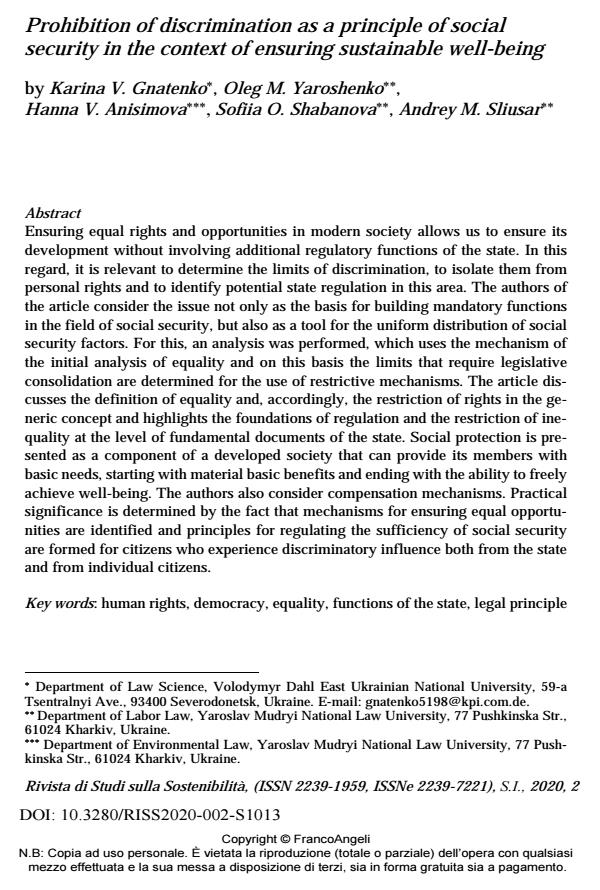Prohibition of discrimination as a principle of social security in the context of ensuring sustainable well-being
Titolo Rivista RIVISTA DI STUDI SULLA SOSTENIBILITA'
Autori/Curatori Karina V. Gnatenko, Oleg M. Yaroshenko, Hanna V. Anisimova, Sofiia O. Shabanova, Andrey M. Sliusar
Anno di pubblicazione 2021 Fascicolo 2020/2 suppl.
Lingua Inglese Numero pagine 15 P. 173-187 Dimensione file 130 KB
DOI 10.3280/RISS2020-002-S1013
Il DOI è il codice a barre della proprietà intellettuale: per saperne di più
clicca qui
Qui sotto puoi vedere in anteprima la prima pagina di questo articolo.
Se questo articolo ti interessa, lo puoi acquistare (e scaricare in formato pdf) seguendo le facili indicazioni per acquistare il download credit. Acquista Download Credits per scaricare questo Articolo in formato PDF

FrancoAngeli è membro della Publishers International Linking Association, Inc (PILA), associazione indipendente e non profit per facilitare (attraverso i servizi tecnologici implementati da CrossRef.org) l’accesso degli studiosi ai contenuti digitali nelle pubblicazioni professionali e scientifiche.
Ensuring equal rights and opportunities in modern society allows us to ensure its development without involving additional regulatory functions of the state. In this regard, it is relevant to determine the limits of discrimination, to isolate them from personal rights and to identify potential state regulation in this area. The authors of the article consider the issue not only as the basis for building mandatory functions in the field of social security, but also as a tool for the uniform distribution of so-cial security factors. For this, an analysis was performed, which uses the mecha-nism of the initial analysis of equality and on this basis the limits that require legis-lative consolidation are determined for the use of restrictive mechanisms. The arti-cle discusses the definition of equality and, accordingly, the restriction of rights in the generic concept and highlights the foundations of regulation and the restriction of inequality at the level of fundamental documents of the state. Social protection is presented as a component of a developed society that can provide its members with basic needs, starting with material basic benefits and ending with the ability to freely achieve well-being. The authors also consider compensation mechanisms. Practical significance is determined by the fact that mechanisms for ensuring equal opportunities are identified and principles for regulating the sufficiency of social security are formed for citizens who experience discriminatory influence both from the state and from individual citizens.
Parole chiave:Human rights, democracy, equality, functions of the state, legal principle
Karina V. Gnatenko, Oleg M. Yaroshenko, Hanna V. Anisimova, Sofiia O. Shabanova, Andrey M. Sliusar, Prohibition of discrimination as a principle of social security in the context of ensuring sustainable well-being in "RIVISTA DI STUDI SULLA SOSTENIBILITA'" 2 suppl./2020, pp 173-187, DOI: 10.3280/RISS2020-002-S1013